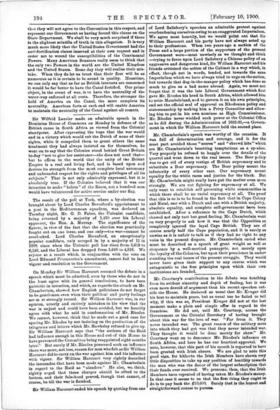Mr. Chamberlain's speech was worthy of the occasion. It was
full of determination and courage, and it for the most part avoided those " scores " and "shrewd hits" which are Mr. Chamberlain's besetting temptations as a speaker. Very properly he refused to haggle over the details of the quarrel and went down to the real issues. The Boer policy was to get rid of every eestige of British supremacy and to substitute a Boer supremacy. The Boer policy meant the
inferiority of every other race. Our supremacy meant equality for the white races and justice for the black. But Mr. Chamberlain might really have put the matter even more strongly. We are not fighting for supremacy at all. We only want to establish self governing white communities in which there shall be no racial supremacy at all. The proof that this is so is to be found in the fact that in Cape Colony and Natal, one with a Dutch and one with a British majority, absolute equality, and complete self-government have been established. After a reference to the Cape Dutch, which showed not only tact but good feeling, Mr. Chamberlain went on very properly to ask how it was that the Opposition so completely ignored the loyal Cape British. They are of course nearly half the Cape population, and it is surely as unwise as it is unfair to talk as if they had no right to any voice in the present dispute. Mr. Chamberlain ended what must be described as a speech of great weight as well as eloquence by a well-merited panegyric, not merely upon the loyalty of the Colonies, but upon their prescience in under standing the real issues of the present straggle. They would never have given their support to any coarse which was antagonistic to the free principles upon which their own institutions are founded.


































 Previous page
Previous page